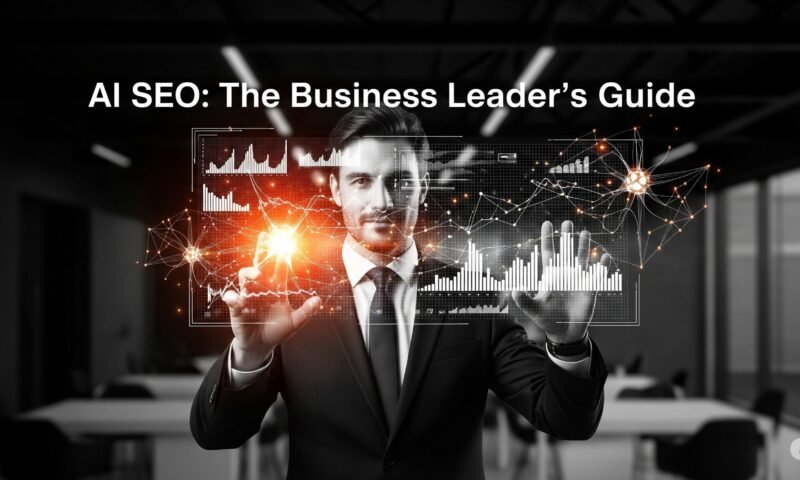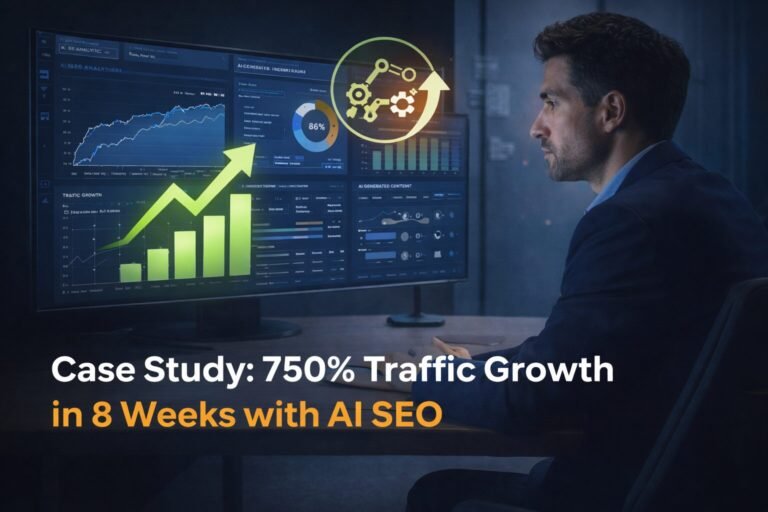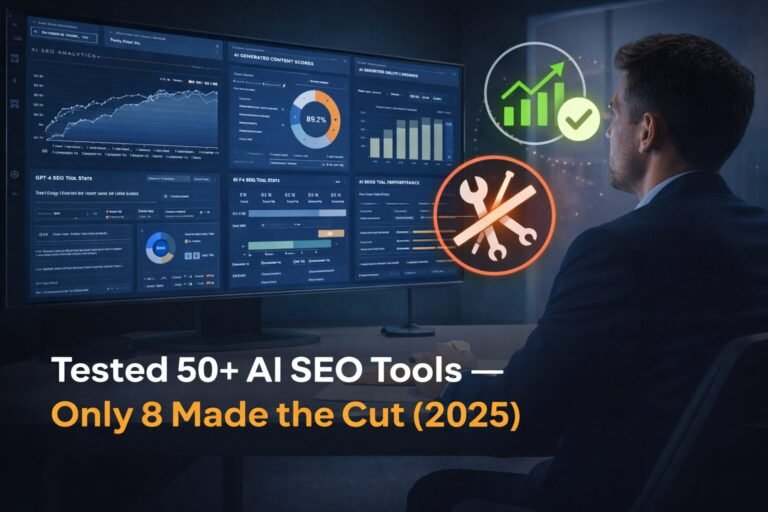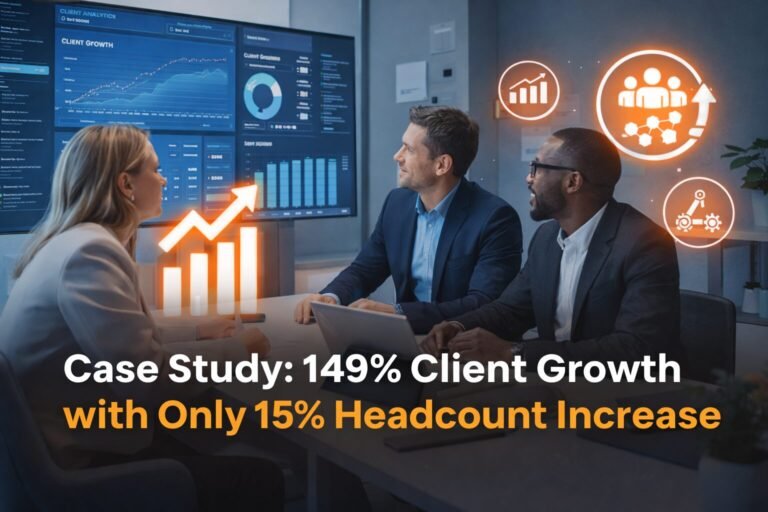Understanding AI SEO in Today’s Digital Landscape
What is AI SEO and Why It Matters Now
AI SEO (Artificial Intelligence Search Engine Optimization) represents the fundamental shift in how we approach search visibility. It’s not just another buzzword—it’s the integration of machine learning, natural language processing, and large language models into search optimization strategies.
I’ve personally witnessed this transformation unfold. In early 2023, I started experimenting with simple AI tasks for SEO. By 2024, I was building complete AI-driven SEO systems. The result? My business now operates at 77% of previous operational costs while executing SEO strategies 300% faster.
Why does this matter now? Because 86% of SEO professionals have already integrated AI into their strategies, and Google’s AI Overviews now appear in approximately 13% of all search queries—nearly doubling from just six months prior. The businesses that adapt to this new reality will gain a significant competitive advantage.
The Evolution of Search: From Keywords to Intent
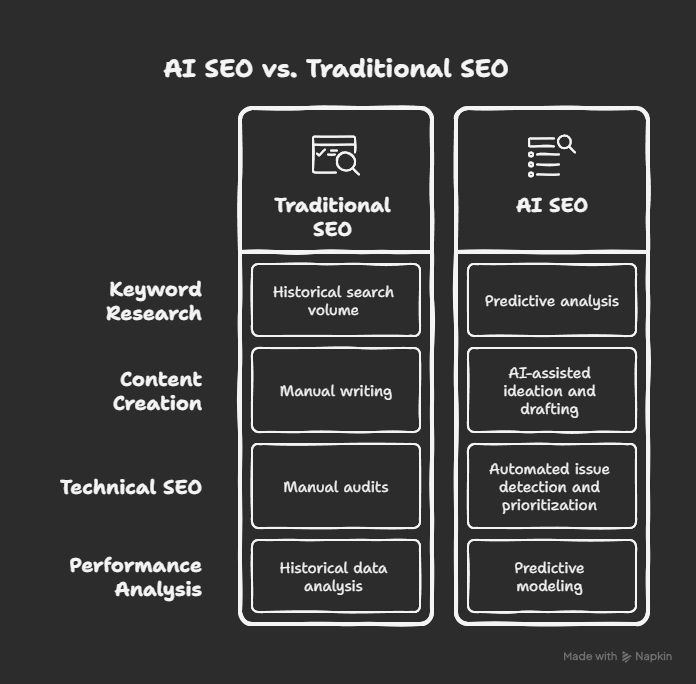
Traditional SEO operated on a relatively straightforward premise: identify high-volume keywords, include them in specific densities throughout a page, build backlinks containing those terms, and improve rankings. This approach was formulaic and mechanical.
AI SEO, however, prioritizes understanding user intent and delivering relevant, comprehensive, high-quality content. Modern search engines use natural language processing to understand the context behind queries, allowing them to serve results that answer the searcher’s actual question—not just pages that contain matching keywords.
For example, when someone searches “apple nutrition,” Google now understands they’re likely looking for nutritional information about the fruit, not Apple Inc. products. This shift from exact-match keywords to semantic understanding represents the most significant change in search since Google’s founding.
How Search Engines Are Using AI to Transform Results
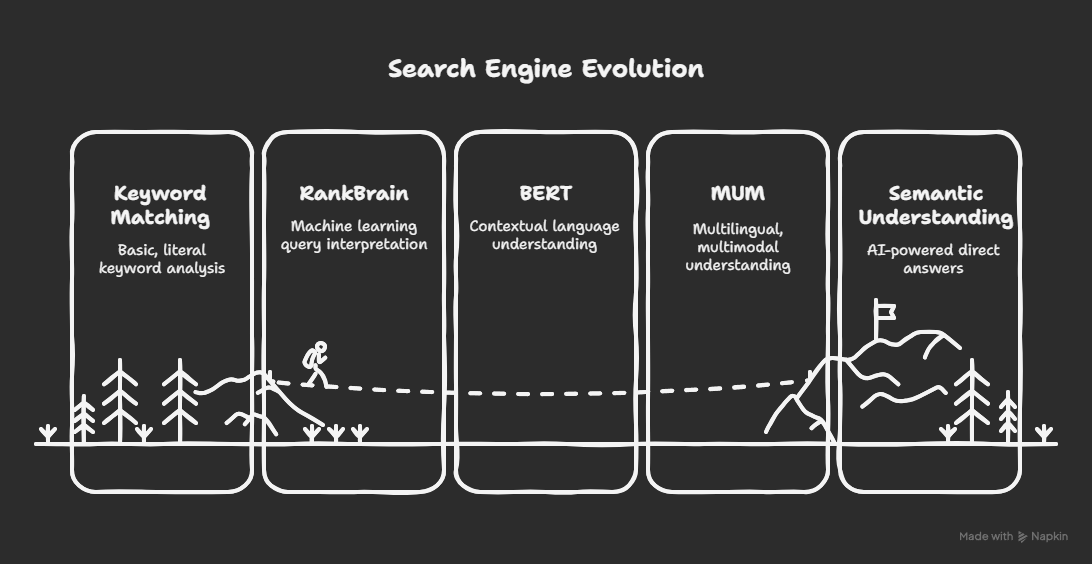
Search engines have undergone a dramatic architectural transformation, incorporating sophisticated AI systems at their core:
- RankBrain (2015): This machine-learning system helps Google interpret queries it has never seen before by connecting them to similar known queries. It now processes over 15% of Google’s 8.5 billion daily searches.
- BERT (2019): Bidirectional Encoder Representations from Transformers processes natural language by inferring the meaning of words from context, recognizing subtle linguistic nuances that earlier algorithms missed.
- MUM (2021): Multitask Unified Model is 1,000 times more powerful than BERT and can understand information across 75 languages and multiple content formats simultaneously.
- AI Overviews and SGE (2024): Google’s AI Overviews use generative AI to provide direct answers to complex queries by synthesizing information from multiple sources.
These technologies have fundamentally changed how search results are generated and ranked, making AI-powered SEO approaches essential for businesses seeking visibility.
Get Your Free AI SEO Agent
Transform your website’s performance with our powerful SEO AI agents. Complete setup guide included – no technical expertise required.
The Business Case for AI SEO Implementation
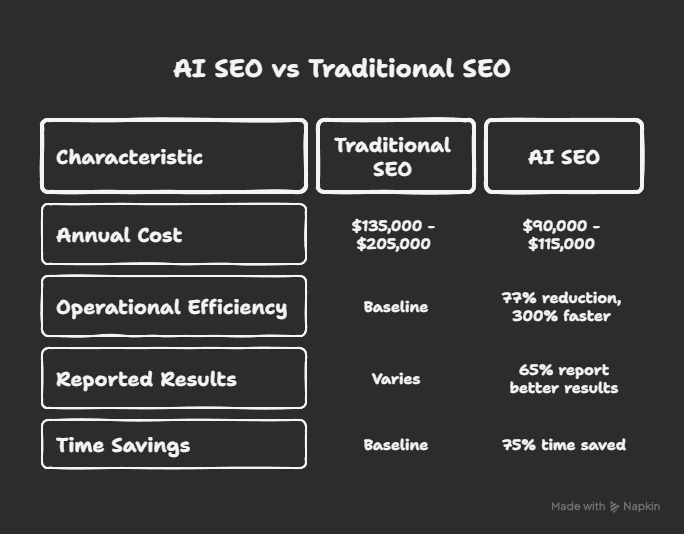
ROI Potential: Efficiency Gains and Performance Improvements
The business case for AI SEO is compelling. When I implemented AI-driven SEO strategies across my operations, I achieved a 77% reduction in costs while improving execution speed by 300%. But let’s look beyond my experience to broader industry data:
- 65% of businesses have noticed better SEO results with the help of AI
- 52% of SEO professionals noticed performance improvement from using AI for on-page SEO
- AI-powered tools save up to 50% of time spent on data analysis and interpretation
- 75% of businesses leverage AI to reduce the time spent on manual tasks like keyword research and meta-tag optimization
For a typical mid-market B2B company spending $60,000+ annually on SEO staff and tools, implementing AI SEO can deliver the same or better results for less than $30,000—while freeing up your team to focus on strategy rather than repetitive tasks.
Resource Allocation: Building Your AI SEO Team and Budget
Traditional SEO scaling meant hiring more specialists—content writers, link builders, technical SEO experts, analysts. Each addition meant more management overhead and higher fixed costs.
AI SEO changes this equation. Instead of hiring a team of junior specialists, you can implement AI tools and workflows that handle 85%+ of routine SEO tasks with minimal human oversight. This allows you to maintain a lean team focused on strategy, creativity, and business outcomes.
The resource allocation shifts from:
- 2-3 junior SEO specialists ($120,000-$180,000 annually)
- Multiple SEO tool subscriptions ($15,000-$25,000 annually)
To:
- 1 senior SEO strategist ($80,000-$100,000 annually)
- AI SEO tools and platforms ($10,000-$15,000 annually)
- Implementation and training ($5,000-$10,000 one-time)
This approach delivers better results while reducing costs by approximately 50%.
Competitive Advantage: Early Adopters vs. Late Movers
In my experience working with B2B SaaS companies, those who implement AI SEO early gain a sustainable competitive advantage. They’re able to:
- Identify and capitalize on emerging search trends 4-6 weeks before competitors
- Produce and optimize content at 3-5 times the speed of traditional methods
- Adapt to algorithm changes within hours rather than days or weeks
- Achieve higher rankings with less resource expenditure
The businesses waiting to adopt AI SEO will find themselves playing catch-up as competitors capture market share and establish authority in key search verticals.
Get Your Free AI SEO Agent
Transform your website’s performance with our powerful SEO AI agents. Complete setup guide included – no technical expertise required.
Key Areas Where AI Transforms SEO Strategy
AI-Powered Keyword Research and Intent Analysis
Traditional keyword research relied on historical search volume and competition metrics. AI transforms this process through:
- Predictive analysis: AI systems can identify emerging search trends four to six weeks before they appear in conventional keyword tools by analyzing social media signals, news coverage patterns, and search correlation data.
- Semantic clustering: Modern AI tools identify conceptual relationships between keywords, grouping terms by underlying intent rather than simply by lexical similarity.
- User intent precision: Natural language processing has advanced to better distinguish between various types of search intent, allowing marketers to optimize content that addresses specific user needs rather than simply matching keywords.
I’ve seen businesses reduce their keyword research time by 80% while discovering higher-value opportunities that traditional tools missed.
Content Creation and Optimization with AI
AI transforms content creation from a time-intensive process to a streamlined workflow:
- Content ideation: AI can generate hundreds of content ideas tailored to your audience and business objectives in minutes.
- Content briefs and outlines: AI can analyze top-ranking content for a target keyword and generate comprehensive briefs that outline structure, word count, key points to cover, and questions to answer.
- Draft creation: AI can produce first drafts of content that human writers can then refine, reducing creation time by 60-70%.
- Optimization: AI can analyze existing content against top-ranking pages and provide specific recommendations for improvement, from adding missing subtopics to optimizing readability.
The key is understanding that AI should augment human creativity, not replace it. The most effective approach combines AI’s speed and data processing with human strategic thinking and brand voice.
Technical SEO: AI for Site Audits and Issue Resolution
Technical SEO has traditionally been one of the most time-consuming aspects of search optimization. AI changes this by:
- Automated site audits: AI can crawl and analyze websites, identifying technical issues that impact search performance, from broken links to page speed problems.
- Prioritization: AI can assess the potential impact of each technical issue and prioritize fixes based on expected ROI.
- Implementation guidance: AI can provide specific code snippets and implementation instructions for resolving technical issues.
- Monitoring: AI can continuously monitor site health and alert teams to new issues as they arise.
I’ve seen businesses reduce their technical SEO workload by 75% while improving site health scores by an average of 40% within three months of implementing AI-powered technical SEO tools.
Performance Analysis and Predictive Insights
AI transforms performance analysis from looking at historical data to predicting future outcomes:
- Advanced analytics: AI can identify patterns in performance data that humans might miss, uncovering insights about what’s driving results.
- Predictive modeling: AI can forecast how changes to SEO strategy will impact performance, allowing for data-driven decision making.
- Automated reporting: AI can generate comprehensive performance reports with actionable insights, saving hours of manual analysis.
- Competitive intelligence: AI can monitor competitor strategies and identify opportunities and threats in real-time.
This shift from reactive to proactive SEO allows businesses to stay ahead of algorithm changes and market shifts.
Get Your Free AI SEO Agent
Transform your website’s performance with our powerful SEO AI agents. Complete setup guide included – no technical expertise required.
The Human-AI Balance: Knowing When to Automate and When to Intervene
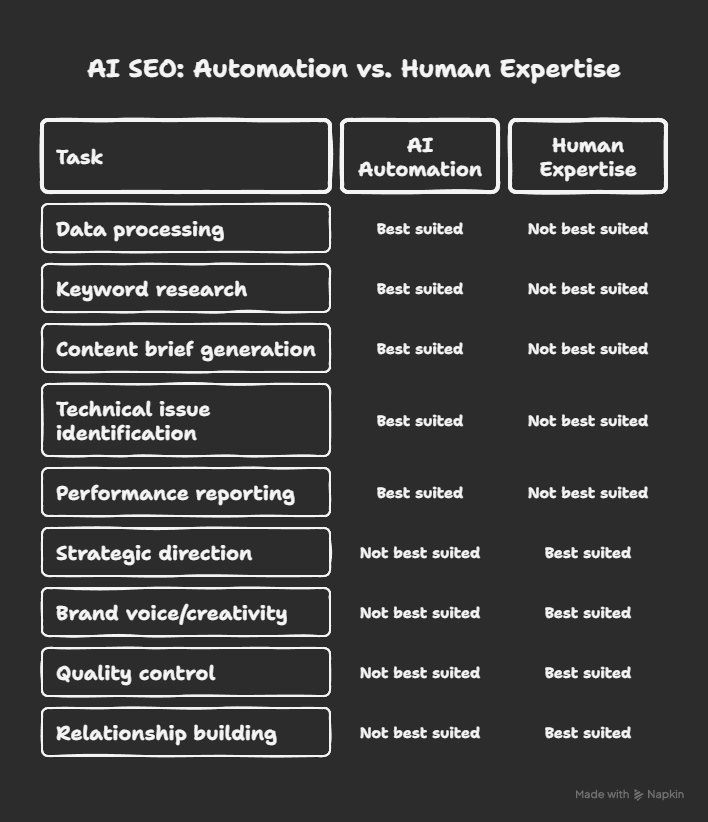
Tasks Best Suited for AI Automation
Through my experience implementing AI SEO across multiple businesses, I’ve identified specific tasks where AI consistently outperforms human efforts:
- Data processing: AI excels at analyzing large datasets and identifying patterns that humans might miss.
- Keyword research and clustering: AI can process thousands of keywords and group them by intent more effectively than manual methods.
- Content brief generation: AI can analyze top-ranking content and generate comprehensive briefs that cover all essential subtopics.
- Technical issue identification: AI can crawl websites and identify technical SEO issues more thoroughly and quickly than manual audits.
- Performance reporting: AI can generate detailed reports with insights and recommendations, saving hours of manual analysis.
These tasks typically follow clear patterns and rules, making them ideal for automation. Implementing AI for these functions can free up 60-80% of your team’s time for higher-value activities.
Areas Requiring Human Expertise and Oversight
Despite AI’s capabilities, certain aspects of SEO still require human expertise:
- Strategic direction: AI can provide data and insights, but humans must set the overall SEO strategy aligned with business objectives.
- Brand voice and creativity: AI can generate content, but humans must ensure it aligns with brand voice and provides unique perspectives.
- Quality control: Humans must review AI-generated content and recommendations to ensure accuracy and appropriateness.
- Relationship building: Link building and influencer outreach require human relationship skills that AI cannot replicate.
- Interpretation and judgment: AI can identify patterns, but humans must interpret what those patterns mean for the business and make strategic decisions.
The most effective AI SEO implementations typically automate 70-80% of routine tasks while keeping humans focused on strategy, creativity, and relationship building.
Creating an Effective Workflow Between AI Tools and Your Team
Creating an effective human-AI workflow requires careful planning and clear processes:
- Define responsibilities: Clearly specify which tasks will be handled by AI and which require human intervention.
- Establish review processes: Implement quality control checkpoints where humans review AI-generated work before implementation.
- Create feedback loops: Ensure that human feedback on AI outputs is used to improve future AI performance.
- Train your team: Help your team understand how to work effectively with AI tools, focusing on prompt engineering and output evaluation.
- Iterate and optimize: Continuously refine your human-AI workflows based on results and feedback.
I’ve found that businesses that implement structured human-AI workflows see 3-5 times greater ROI from their AI SEO investments compared to those that don’t.
Implementing AI SEO: A Strategic Roadmap
Assessment Phase: Evaluating Your Current SEO Maturity
Before implementing AI SEO, you need to understand your current position:
- Audit existing processes: Document your current SEO workflows, tools, and team structure.
- Identify pain points: Determine which aspects of your SEO program are most time-consuming, costly, or ineffective.
- Assess team readiness: Evaluate your team’s technical skills and openness to adopting AI tools.
- Review technology stack: Analyze your current SEO tools and identify gaps in capabilities.
- Benchmark performance: Establish baseline metrics for current SEO performance to measure future improvements.
This assessment typically takes 2-4 weeks and provides the foundation for your AI SEO implementation plan.
Tool Selection: Choosing the Right AI SEO Solutions for Your Business
The AI SEO tool landscape is crowded and evolving rapidly. When selecting tools, consider:
- Specific capabilities: Different tools excel at different aspects of SEO (content, technical, analytics, etc.).
- Integration capabilities: Ensure tools can integrate with your existing systems and workflows.
- Scalability: Choose tools that can grow with your business and handle increasing complexity.
- Ease of use: Consider the learning curve and whether your team has the necessary technical skills.
- Cost structure: Evaluate pricing models and ensure they align with your budget and expected ROI.
Based on my experience, most businesses need 3-5 specialized AI SEO tools rather than a single “all-in-one” solution. A typical combination might include:
- An AI content optimization tool
- An AI-powered technical SEO platform
- An AI analytics and reporting solution
- An AI keyword research and clustering tool
Integration Strategy: Implementing AI Tools Without Disruption
Implementing AI SEO tools without disrupting existing operations requires careful planning:
- Start with pilot projects: Test AI tools on specific, limited-scope projects before full implementation.
- Phase implementation: Roll out AI capabilities gradually, starting with the highest-impact, lowest-risk applications.
- Maintain parallel processes: Keep existing processes running while new AI workflows are tested and refined.
- Provide adequate training: Ensure your team has the knowledge and skills to use new AI tools effectively.
- Monitor performance: Track the impact of AI implementation on SEO performance and team productivity.
This phased approach typically takes 3-6 months but significantly reduces implementation risk compared to a “big bang” approach.
Training and Adoption: Ensuring Team Buy-in and Competency
The success of your AI SEO implementation depends heavily on team adoption:
- Address concerns proactively: Acknowledge fears about AI replacing jobs and emphasize how it will enhance rather than replace human roles.
- Provide comprehensive training: Invest in thorough training on both the technical aspects of AI tools and the strategic thinking required to use them effectively.
- Create incentives for adoption: Recognize and reward team members who effectively integrate AI into their workflows.
- Share success stories: Highlight early wins and improvements achieved through AI implementation.
- Foster a culture of experimentation: Encourage your team to test new AI capabilities and share learnings.
In my experience, businesses that invest in comprehensive training and change management see 2-3 times higher adoption rates and ROI from their AI SEO investments.
Real-World Case Studies: AI SEO Success Stories
E-commerce Company Increases Organic Traffic by 67% with AI-Driven Content Strategy
Challenge: A mid-sized e-commerce company selling specialty outdoor gear was struggling to compete with larger retailers in search rankings. Their content creation process was slow and expensive, producing only 4-5 new product category pages per month.
Solution: The company implemented an AI SEO workflow that:
- Used AI to analyze top-ranking pages for target keywords and generate comprehensive content briefs
- Employed AI to create first drafts of category pages, which human writers then refined
- Leveraged AI to optimize existing content for semantic relevance and user intent
- Used AI to identify content gaps and opportunities
Results: Within six months, the company achieved:
- 67% increase in organic traffic
- 43% increase in conversion rate from organic traffic
- 300% increase in content production speed
- 40% reduction in content creation costs
Key Takeaway: AI can transform content creation from a bottleneck to a competitive advantage when implemented with proper human oversight and quality control.
B2B Service Provider Reduces Keyword Research Time by 80% While Improving Quality
Challenge: A B2B SaaS company offering project management software was spending 40+ hours per month on manual keyword research and analysis. Their approach was missing emerging trends and failing to identify high-value long-tail opportunities.
Solution: The company implemented an AI-powered keyword research and clustering tool that:
- Analyzed their existing content and search performance to identify strengths and weaknesses
- Identified emerging search trends 4-6 weeks before they appeared in traditional tools
- Clustered keywords by semantic relevance and user intent rather than just search volume
- Prioritized opportunities based on business value and competitive landscape
Results: Within three months, the company achieved:
- 80% reduction in time spent on keyword research
- 35% increase in rankings for target keywords
- Discovery of 200+ high-value long-tail keyword opportunities
- 28% increase in organic leads generated
Key Takeaway: AI can transform keyword research from a time-consuming chore to a strategic advantage, identifying opportunities that manual methods miss.
Local Business Chain Achieves Top Rankings in Multiple Markets with AI-Powered Local SEO
Challenge: A regional chain of wellness centers with 15 locations was struggling to achieve consistent visibility in local search across different markets. Their manual approach to local SEO was inefficient and produced inconsistent results.
Solution: The company implemented an AI-powered local SEO solution that:
- Analyzed local search patterns and competition in each market
- Generated location-specific content and optimization recommendations
- Identified and prioritized local citation opportunities
- Monitored local search performance and provided actionable insights
Results: Within four months, the company achieved:
- Top 3 rankings for “wellness center + [city]” in 12 of 15 markets
- 45% increase in calls from local search
- 38% increase in foot traffic attributed to search
- Consistent brand presence across all locations
Key Takeaway: AI can scale local SEO efforts across multiple markets more effectively than manual methods, ensuring consistent brand presence and performance.
Measuring Success: KPIs and Metrics for AI SEO
Traditional Metrics That Still Matter
While AI transforms many aspects of SEO, traditional metrics remain important for measuring success:
- Organic traffic: Overall volume and quality of visitors from search engines
- Keyword rankings: Positions for target keywords, especially those with commercial intent
- Conversion rates: Percentage of organic visitors who take desired actions
- Backlink profile: Quantity and quality of inbound links
- Domain authority: Overall strength and authority of your website
These metrics provide a foundation for evaluating SEO performance, but they need to be interpreted in the context of AI-driven strategies and the evolving search landscape.
New Metrics for the AI-Powered Search Landscape
The rise of AI in search introduces new metrics that businesses should track:
- Zero-click impression share: Percentage of times your brand appears in search results without generating a click
- AI Overview citation rate: Frequency with which your content is cited in AI-generated search summaries
- Content efficiency ratio: Organic traffic generated per dollar spent on content creation
- AI-assisted task completion rate: Percentage of SEO tasks completed with AI assistance
- Human oversight time: Hours spent reviewing and refining AI-generated work
These metrics provide a more complete picture of SEO performance in an AI-powered search landscape.
Setting Realistic Expectations and Timelines
Implementing AI SEO is not a magic bullet that delivers instant results. Based on my experience, businesses should expect:
- Short-term (1-3 months): Initial efficiency gains, particularly in keyword research and content brief creation
- Medium-term (3-6 months): Noticeable improvements in content quality and relevance, early ranking improvements
- Long-term (6-12 months): Significant increases in organic traffic and conversions, established competitive advantage
The specific timeline depends on factors like your starting point, the competitiveness of your industry, and the quality of your implementation. Setting realistic expectations helps maintain momentum and secure ongoing support for your AI SEO initiatives.
Get Your Free AI SEO Agent
Transform your website’s performance with our powerful SEO AI agents. Complete setup guide included – no technical expertise required.
Navigating Challenges and Pitfalls in AI SEO
Common Implementation Obstacles and How to Overcome Them
Implementing AI SEO comes with challenges. Based on my experience, here are the most common obstacles and how to address them:
Challenge 1: Resistance to Change
- Solution: Involve team members in the selection and implementation process, provide comprehensive training, and emphasize how AI will enhance rather than replace their roles.
Challenge 2: Poor Quality AI Output
- Solution: Implement robust quality control processes, invest in prompt engineering training, and establish clear guidelines for when and how to refine AI-generated content.
Challenge 3: Tool Overwhelm
- Solution: Start with a focused set of tools addressing your biggest pain points, master those before adding more, and prioritize integration capabilities when selecting tools.
Challenge 4: Measurement Difficulties
- Solution: Establish baseline metrics before implementation, define clear KPIs for AI SEO initiatives, and implement tracking systems to measure both efficiency gains and performance improvements.
Challenge 5: Budget Constraints
- Solution: Start with high-impact, low-cost AI tools, demonstrate ROI with pilot projects, and reinvest savings into expanded AI capabilities.
By anticipating these challenges and planning for them, you can significantly increase your chances of successful AI SEO implementation.
Quality Control: Ensuring AI-Generated Content Meets Standards
One of the biggest concerns with AI SEO is maintaining quality standards. Here’s how to ensure AI-generated content meets your requirements:
- Establish clear guidelines: Define specific standards for accuracy, tone, structure, and comprehensiveness.
- Implement review processes: Require human review of all AI-generated content before publication, with specific checklists for quality assessment.
- Use AI quality tools: Leverage AI tools specifically designed to evaluate content quality, readability, and SEO effectiveness.
- Test and measure: Continuously test AI-generated content against human-created content and measure performance differences.
- Iterate and improve: Use performance data and feedback to refine your AI content generation processes over time.
I’ve found that businesses with robust quality control processes achieve 85%+ accuracy with AI-generated content while reducing creation time by 60-70%.
Maintaining Brand Voice and Authenticity with AI Assistance
AI can sometimes generate generic or inconsistent content that doesn’t reflect your unique brand voice. Here’s how to maintain authenticity:
- Develop comprehensive brand guidelines: Document your brand voice, tone, style preferences, and messaging framework.
- Create custom AI training: Use your existing high-performing content to train AI models on your specific brand voice and style.
- Implement brand voice checklists: Create specific criteria for evaluating whether AI-generated content aligns with your brand voice.
- Use human editors strategically: Employ human editors specifically focused on ensuring brand consistency across all content.
- Continuously refine: Regularly review AI-generated content and provide feedback to improve alignment with brand voice over time.
The most successful implementations I’ve seen treat AI as a junior writer that requires senior human oversight to ensure brand consistency and authenticity.
Ethical Considerations and Best Practices
Transparency: When and How to Disclose AI Usage
As AI becomes more prevalent in SEO, transparency about its use is increasingly important:
- For content: Consider whether and how to disclose AI’s role in content creation, particularly for sensitive topics or industries where trust is paramount.
- For data usage: Be transparent about how you’re using customer and search data to train AI systems.
- For automation: Be clear with your team and stakeholders about which processes are automated and which involve human judgment.
- For results: When reporting on SEO performance, be transparent about the role AI played in achieving those results.
Transparency builds trust with both your audience and your team, and it’s increasingly important as AI becomes more integrated into business processes.
Data Privacy and Security in AI SEO Implementation
AI SEO implementation often involves processing significant amounts of data, raising privacy and security concerns:
- Data collection: Ensure you have appropriate permissions and legal basis for collecting and using data for AI training.
- Data storage: Implement secure storage solutions for any data used with AI systems, particularly customer or proprietary business data.
- Third-party tools: Evaluate the data privacy and security practices of any AI tools you implement, particularly where sensitive data is involved.
- Compliance: Ensure your AI SEO practices comply with relevant regulations like GDPR, CCPA, and industry-specific requirements.
- Access controls: Implement appropriate access controls to ensure only authorized personnel can access AI systems and data.
Prioritizing data privacy and security not only protects your business but also builds trust with customers and partners.
Future-Proofing Your Strategy Against Algorithm Changes
Search algorithms continue to evolve rapidly, particularly as AI becomes more integrated into search. To future-proof your AI SEO strategy:
- Focus on fundamentals: Prioritize creating high-quality, user-centric content that provides genuine value, regardless of algorithm changes.
- Diversify approaches: Don’t rely solely on AI for any single aspect of SEO; maintain multiple strategies for achieving visibility.
- Stay informed: Continuously monitor search engine announcements, industry developments, and performance data to identify emerging trends.
- Test and adapt: Regularly test new approaches and be willing to pivot your strategy based on results and changing search landscapes.
- Build authority: Focus on establishing genuine authority in your niche through expertise, quality content, and genuine user engagement.
The most future-proof strategies balance AI-driven efficiency with human strategic thinking and a fundamental commitment to providing value to users.
The Future of AI SEO: Trends to Watch
Generative Engine Optimization (GEO): The Next Frontier
Generative Engine Optimization (GEO) represents the next evolution of SEO, focusing specifically on optimizing content to be featured, cited, and referenced in AI-generated responses from systems like ChatGPT, Claude, Gemini, and Google’s AI Overviews.
While traditional SEO aims to rank a webpage in search results, GEO seeks to have your content selected as a source for AI-generated answers, effectively positioning your brand as the authority that informs AI responses.
A study by researchers from Princeton University, Georgia Tech, The Allen Institute for AI, and IIT Delhi found that implementing GEO methods like including citations, quotations from relevant sources, and statistics boosted source visibility by over 40% in AI-generated responses.
As AI-powered search becomes more prevalent, GEO will become increasingly important for maintaining visibility and authority.
The Rise of Zero-Click Searches and How to Adapt
The prevalence of featured snippets, knowledge panels, and AI-generated answers has led to more “zero-click searches” where users get their answers directly from the search results page without clicking through to a website.
According to a 2024 study, 58.5% of Google searches in the United States ended without a click. This means that users found the information they needed directly on the search results page, without clicking through to any website.
This shift requires adapting SEO strategies to:
- Optimize for featured snippets and position zero
- Build brand visibility in search results even without clicks
- Focus on impression share and brand mentions as key metrics
- Create content that provides immediate value in search results
Businesses that adapt to this reality will maintain visibility even as traditional click-through rates decline.
Preparing for Multi-Platform AI Optimization (Beyond Google)
While Google remains the dominant search engine, AI-powered platforms like ChatGPT, Claude, and others are becoming increasingly important channels for information discovery.
Preparing for multi-platform AI optimization involves:
- Understanding how different AI platforms source and prioritize information
- Optimizing content for different AI systems’ requirements and preferences
- Building authority across multiple platforms rather than just Google
- Diversifying traffic sources to reduce dependence on any single channel
The most forward-thinking businesses are already developing strategies for visibility across multiple AI platforms, recognizing that the future of search will be increasingly multi-platform.
Get Your Free AI SEO Agent
Transform your website’s performance with our powerful SEO AI agents. Complete setup guide included – no technical expertise required.
Getting Started: Your First Steps in AI SEO Implementation
Quick Wins: Low-Hanging Fruit for Immediate Impact
If you’re ready to implement AI SEO but don’t know where to start, focus on these high-impact, low-risk opportunities:
- AI-powered keyword research: Implement an AI keyword tool to identify opportunities and cluster keywords by intent. This typically delivers immediate value with minimal risk.
- Content brief generation: Use AI to analyze top-ranking content and generate comprehensive briefs for human writers. This improves content quality while reducing creation time.
- Meta tag optimization: Leverage AI to generate and optimize title tags and meta descriptions at scale. This is a low-risk, high-impact application of AI.
- Technical issue identification: Use AI-powered crawling tools to identify technical SEO issues that may be hurting your performance.
- Content gap analysis: Implement AI to analyze your existing content against competitors and identify gaps and opportunities.
These quick wins typically deliver measurable results within 30-60 days, building momentum and support for broader AI SEO initiatives.
Building a Long-Term AI SEO Strategy
Beyond quick wins, developing a comprehensive long-term AI SEO strategy involves:
- Assessment and planning: Thoroughly evaluate your current SEO capabilities and define clear objectives for AI implementation.
- Tool selection and integration: Carefully select AI tools that address your specific needs and integrate them into your existing workflows.
- Team training and development: Invest in comprehensive training to ensure your team can effectively use AI tools and interpret their outputs.
- Process optimization: Redesign your SEO workflows to leverage AI capabilities while maintaining appropriate human oversight.
- Measurement and iteration: Implement robust measurement systems to track the impact of AI on SEO performance and continuously refine your approach.
This comprehensive approach typically takes 6-12 months to fully implement but delivers sustainable competitive advantage and significant efficiency gains.
Resources for Continued Learning and Development
AI SEO is a rapidly evolving field, and staying current requires ongoing learning. Here are valuable resources:
- Industry publications: Search Engine Land, Search Engine Journal, and other leading SEO publications regularly cover AI developments.
- Tool documentation: The best AI SEO tools provide extensive documentation, tutorials, and best practices.
- Online communities: Reddit, LinkedIn groups, and specialized forums offer opportunities to learn from peers and experts.
- Conferences and webinars: Industry events increasingly focus on AI in SEO and provide valuable insights from practitioners.
- Training programs: Specialized courses on AI in digital marketing are becoming more widely available.
By committing to continuous learning, you can stay at the forefront of AI SEO developments and maintain your competitive advantage.
The integration of AI into SEO represents not just a technological shift but a fundamental transformation in how businesses approach search visibility. By balancing automation with human expertise, you can achieve better results with fewer resources while building a sustainable competitive advantage.
I’ve personally seen businesses reduce operational costs by 77% while improving execution speed by 300% through strategic AI SEO implementation. The businesses that embrace this transformation will thrive in the evolving search landscape, while those that cling to traditional methods will find themselves increasingly at a disadvantage.
The question isn’t whether to adopt AI SEO, but how quickly and effectively you can implement it to gain competitive advantage. The tools and strategies outlined in this guide provide a roadmap for that implementation, helping you balance automation with human expertise to achieve superior results.
Get Your Free AI SEO Agent
Transform your website’s performance with our powerful SEO AI agents. Complete setup guide included – no technical expertise required.
